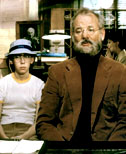
Movie Guru Rating:

Comment
on this review
| |

The Royal Tenenbaums presents a royal treat
by Adrienne Martini
Genius is over-rated—both the word itself and the concept. Those six letters get attached to so many different persons, as a result of either a marketing blitz or a lazy writer, that they've ceased to contain any real meaning anymore. And the state of actually being a genius seems like something to be avoided. Genius flares and fades; true geniuses are always stuck in a kind of twilight life where they are driven by whatever singular passion fuels their brilliance, rather than experiencing all of life's rich pageant, to rip-off R.E.M. Plus, they never seem to meet with good ends. Geniuses, that is, not R.E.M.
The Royal Tenenbaums, while it concerns geniuses, isn't the work of one. Wes Anderson, a smart and gifted filmmaker, isn't struck by the touch of true genius nor, most likely, will he at this late stage in his life. Which is a damn good thing—Tenenbaums proves that he's been paying frighteningly close attention to what worked (and didn't) in his previous films and has put that hard-won knowledge to good use. Where Rushmore was a great leap forward from his first film Bottle Rocket, Tenenbaums is an exponential leap forward from Rushmore. It truly makes you eager to find out where he'll go next and his lack of genius-related baggage ensures that there will be a next.
What's especially gratifying about pondering Anderson's future films is that where Anderson (and co-writer Owen Wilson) goes always turns out to be a truly neat place, full of interesting characters, with a strong sense of visual style. Some critics have argued that Anderson's quirky take on life is starting to wear thin, that audiences find his larger-than-life characters hard to identify with anymore since we've already been exposed to so much filmic whimsy in the last couple of years. It's a valid point but doesn't hold much stock when talking about Tenenbaums. These characters are so finely drawn, full of both strange habits and real emotion, that it's hard to discount them as simply Anderson's constructs. There's a lot more going on here than mere reliance on smug, coy quirkiness.
While the ideas the film explores are complicated, the plot is disarmingly simple. The three Tenenbaum siblings—geniuses each one—move back into the family home, after they fall into a kind of life eddy. Father Royal Tenenbaum, after a long estrangement, connives to move back in as well by convincing the family that he's dying. Machinations ensue. Lies are revealed, as are truths. Wounds are opened and healed and opened again. There's a wedding, a divorce, and a couple of deaths. In the end, conclusions are reached, and most of them are satisfying.
But that's not what the film is really about; it's merely the framework Anderson and company climb in order to examine the nature of families. At the core of Tenenbaums, once you strip past the layers of amusing character traits and ironic plot turns, lies its throbbing emotional heart, which beats with both a wild affection and distaste for all of the stuff that goes along with being related to other people. This theme is expressed best in the moments that Anderson sets up where his characters to rub up against each other (literally, in one case), exposing the relationships and old hurts in facial expressions and gesture. It's not about the words the actors utter so much as it is all of the other stuff in the frame that really knocks home the point of Tenenbaums. And the inspired part is that Anderson, the actors, costume designer Karen Patch and production designer David Wasco have created a world that entertains your eyes so much that you can't help but take it all in.
Of course, without this cast, Anderson, brilliant vision and all, would be screwed. Gene Hackman makes Royal's gruff unavailability somehow charming and Anjelica Huston brings luminous intelligence to matriarch Etheline. Bill Murray proves that the kudos he received for his actual acting (as opposed to his usually somewhat phoned-in comedic performances) in Rushmore weren't a fluke.
The performances of the three former child geniuses—Ben Stiller, Luke Wilson, and Gwyneth Paltrow—feel as if they drive the movie, despite the fact that it is truly an ensemble piece. Stiller, who does barely repressed anger better than any actor currently in the biz, doesn't let that one note of emotion define his performance. One emotional state or, rather, the lack of any emotions at all, does drive Wilson—but only to a point (and the depiction of his tennis court breakdown, while not flashy, is humbly moving). Paltrow surprises the most, simply because her character seems both far removed from who she is as well as eerily similar to who she is when she's not being Gwyneth Paltrow.
In the end, The Royal Tenenbaums is not a work of sheer genius. Instead it is something a damn sight better.

January 10, 2001 * Vol. 12, No. 2
© 2000 Metro Pulse
|